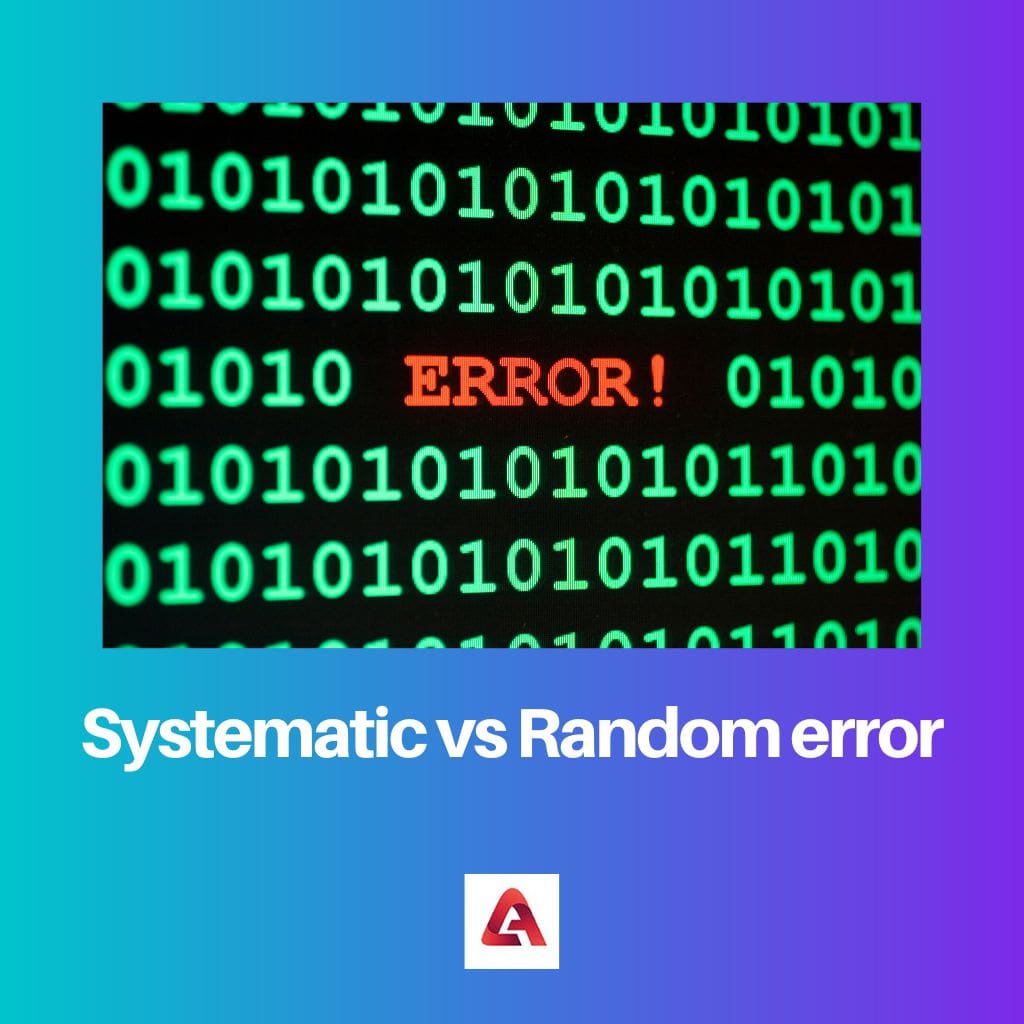It becomes almost impossible to avoid errors when taking the exact measurements or facing problems with the equipment. The measurements of physical quantities cannot always be the correct values.
To avoid such errors, scientists try to classify errors and remove uncertainties in their measurements.
There are two main kinds of errors- Systematic error and Random error. Knowing about systematic and random errors helps us to perform the experiments better and to reduce errors.
Key Takeaways
- Systematic error is a consistent, repeatable deviation from the true value in a measurement or experiment, caused by faulty equipment or biased methodology.
- Random error is an unpredictable, inconsistent deviation from the true value due to unpredictable factors, such as measurement techniques or environmental conditions.
- The key differences between systematic and random errors lie in their causes and predictability, with systematic errors being consistent and attributable to specific factors. In contrast, random errors are inconsistent and difficult to predict.
Systematic vs. Random Error
Systematic errors occur due to flaws in experimental design or equipment, such as a misaligned instrument, faulty calibration, or improper measurement method. Random errors can lead to imprecision but can be reduced by taking multiple measurements and averaging results.

Comparison Table
| Parameters of Comparison | Systematic Error | Random Error |
|---|---|---|
| Meaning | A systematic error is an error that arises because of a fault in the measuring device. | A random error is an error that arises because of unpredictable changes in the environment. |
| Repetitive | Systematic errors are repetitive. | Random errors are not repetitive. |
| Causes | Flaws in the experimenting equipment. | Unpredictable variations in readings and disturbances in the environment. |
| Reduction | Systematic errors can be reduced by using the correct apparatus or proper techniques. | Random errors can be reduced by repeating the readings and increasing the number of observations. |
| Types | Three types: Instrument, Environment, and Systematic error. | No types. |
| Reproducible | These are reproducible. | These are not reproducible. |
| Magnitude of error | Constant | Vary |
What is Systematic Error?
Systematic error is also known as systematic bias. These are consistent errors that can be repeated because of the flawed experimental design.
Sources of systematic errors:
- Incorrectly calibrated instrument
- Worn out instrument
- An individual taking the measurement incorrectly
There are three types of systematic errors:
- Instrumental error- Basically, there are three causes of instrumental errors:
- Misuse of the experimental setup.When the mechanical structure of the setup is not perfect.
- When there is a loading effect.
- Observational error arises when the observer does not interpret the readings correctly.
- Environmental error- When there are changes in the surroundings, such as pressure, humidity, and so on, it may give rise to environmental errors.
What is Random Error?
As the name suggests, a random error is irregular and cannot be forecasted. Such errors arise when some limitations are not in the experimenter’s control.
Random error is also known as statistical error. This is so because such errors can be eliminated by statistical means because it is irregular and inconsistent.
Unlike systematic errors, random errors can be decreased by taking the observations repeatedly and the average of many observations.
Main Differences Between Systematic and Random Error
- Systematic errors are reproducible, whereas random errors are not reproducible.
- The magnitude of error is constant in systematic errors and may vary in random errors.
- https://journals.ametsoc.org/mwr/article/121/1/173/65053
- https://journals.ametsoc.org/jhm/article/17/4/1119/342820

An interesting and well-written article!
I couldn’t agree more. The post provides comprehensive information about systematic and random errors.
The real-life examples of systematic and random errors add a practical dimension to this article.
The relatability of the examples makes the content more accessible to various readers.
Absolutely. The examples effectively demonstrate the concepts discussed.
The comparison table provides a useful summary of the differences between the two types of errors.
Definitely. The structure of the comparison table really helps in understanding the nuances of each type of error.
I don’t think the post emphasizes enough on the unpredictability of random errors.
I think the unpredictability was addressed, but perhaps the post could underscore it more clearly.
It’s true, the nature of random errors and the difficulty of prediction could be highlighted more strongly to avoid misconceptions.
The detailed explanation of the causes of systematic errors adds great value to this article.
I agree, the clarity in defining the sources of systematic errors is commendable.
Absolutely. It’s rare to find such in-depth discussions on the specifics of errors, and this article does it well.
I find it misleading to state that systematic errors are caused by faulty equipment. There’s more to it than that.
I think you’re taking this too literally. The general idea is communicated effectively.
I understand your point, but the post also mentioned biased methodology. Perhaps it could be more explicit about the various causes of systematic errors.
A concise yet informative read.
Agreed. The brevity of the article doesn’t take away from the depth of information provided.
This article is extremely informative. The discussion on the sources of systematic errors is particularly insightful.
Agreed, the clarity in categorizing sources of errors is commendable.
I particularly appreciate the detailed breakdown of the types of systematic errors.
A commendable attempt at clarifying a complex topic.
I couldn’t agree more. The post’s explanations are well-managed and easy to understand.
It’s refreshing to read a well-researched article with clear-cut distinctions between different types of errors.
A well-written article. It effectively delineates between systematic and random errors.
I couldn’t agree more. The clear differences between the two types of errors are well outlined.
In my opinion, the article could be more engaging. It seems rather dry.